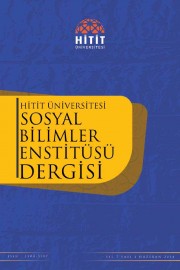Babasız Gebelik Mitleri Bağlamında Türk Mitolojisinde Gök-Yer Dikotomisi ve Ana Tanrıça Kültünün İzleri
Sky-Earth Dichotomy and Traces of Mother Goddess Cult in Turkish Mythology in Context of Fatherless Pregnancy Myths
Author(s): Mehmet Ali YolcuSubject(s): Cultural history, Customs / Folklore, Social history
Published by: Hitit Üniversitesi Sosyal Bilimler Enstitüsü
Keywords: mother goddess; Turkish mythology; cult; fatherless conception motif; beliefs;
Summary/Abstract: It is known that one very important step human kind took is the transition from a hunter-gatherer society to a productive neolithic society. This step from a primitive society to a civilizied society left an important impact on beliefs and thoughts. Through the end of the Paleolithic era, probably due to not knowing the function of men in the process of conception, women gave birth on their own and therefore are seen as the creator. Within the gender based division of labor women take charge of growing plants in the primitive garden agriculture, whıch both raised their societal state and made grounds for a mythic thought process based on a goddess which relates to reproduction, birth, soil, abundance and fertility. Worshipping this mother goddess existed until the time of a dominantly patriarchal society based on slavery, which is strengthened by the invention of cultivation and by professional agriculture, arose. The mother goddess cult did not disappear suddenly in the society structured on patriarchy but rather it lived on in the back ground, entrenched in various beliefs, stories and rituals for a long time. In ancient societies, lover-lover or mother-son relationships were established between father gods and mother goddesses and therefore, a holy pregnancy and then a birth occurred.
Journal: Hitit Üniversitesi Sosyal Bilimler Enstitüsü Dergisi
- Issue Year: 7/2014
- Issue No: 1
- Page Range: 70-92
- Page Count: 23
- Language: Turkish

